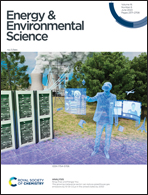Stepping away from purified solvents in reductive catalytic fractionation: a step forward towards a disruptive wood biorefinery process†
Abstract
Lignin-first reductive catalytic fractionation (RCF) is an emerging lignocellulose biorefinery technology that produces a unique lignin-derived bio-oil rich in functionalized phenolics in addition to (hemi)cellulose products. We present here a novel industrial-scale process that achieves a drastic reduction of the costs and the CO2 footprint of RCF biorefining through a reaction liquor and solvent recycle system by which the pristine solvent, here methanol, is enriched with reaction (by-)products resulting in novel solvent mixtures other than the pure solvent(s) (e.g., methanol or methanol/water) commonly used in RCF. The impact of the liquor recycling %, a key process variable that determines the load on the crude oil distillation column for solvent recuperation, was systematically examined through a coupled techno-economic analysis (TEA) and life cycle assessment (LCA) of the RCF biorefinery processing 150 kton birch wood per year. These analyses showed that the lignin oil minimum selling price (MSP-RLO) and global warming potential (GWP-RLO) can be as low as 1000 € per ton and 1.5 kgCO2 kgProduct−1 at a high liquor recycling (>70%) as the fuel consumption and capital costs associated with energy provisioning are significantly reduced in this way. These modelling results were corroborated by lab-scale experiments that mimic the simulated unique solvent compositions. Solvent mixtures comprising methanol (40–65 vol%), methyl acetate (20–25 vol%), acetic acid (0–2 vol%), water (10–20 vol%), and crude lignin oil (10–20 vol%) enhance lignin extraction (90–95%), achieve high monomer yields (syringyl-monomer yield >20%) and stimulate hemicellulose co-extraction (>45%). In addition, novel lignin oil phenolics are produced by partial acetylation of propanol sidechains. The RCF biorefinery economics were improved by lowering the reaction time and temperature at high liquor recycling to limit the reactor capital costs. By halving the reaction time from 2 to 1 h, the MSP-RLO drops to ∼800 € per ton despite a somewhat lower lignin oil productivity. Finally, the general applicability of this process design was shown by applying the integrated computational-experimental approach developed in this work on a softwood, and a hardwood with high moisture content.



 Please wait while we load your content...
Please wait while we load your content...